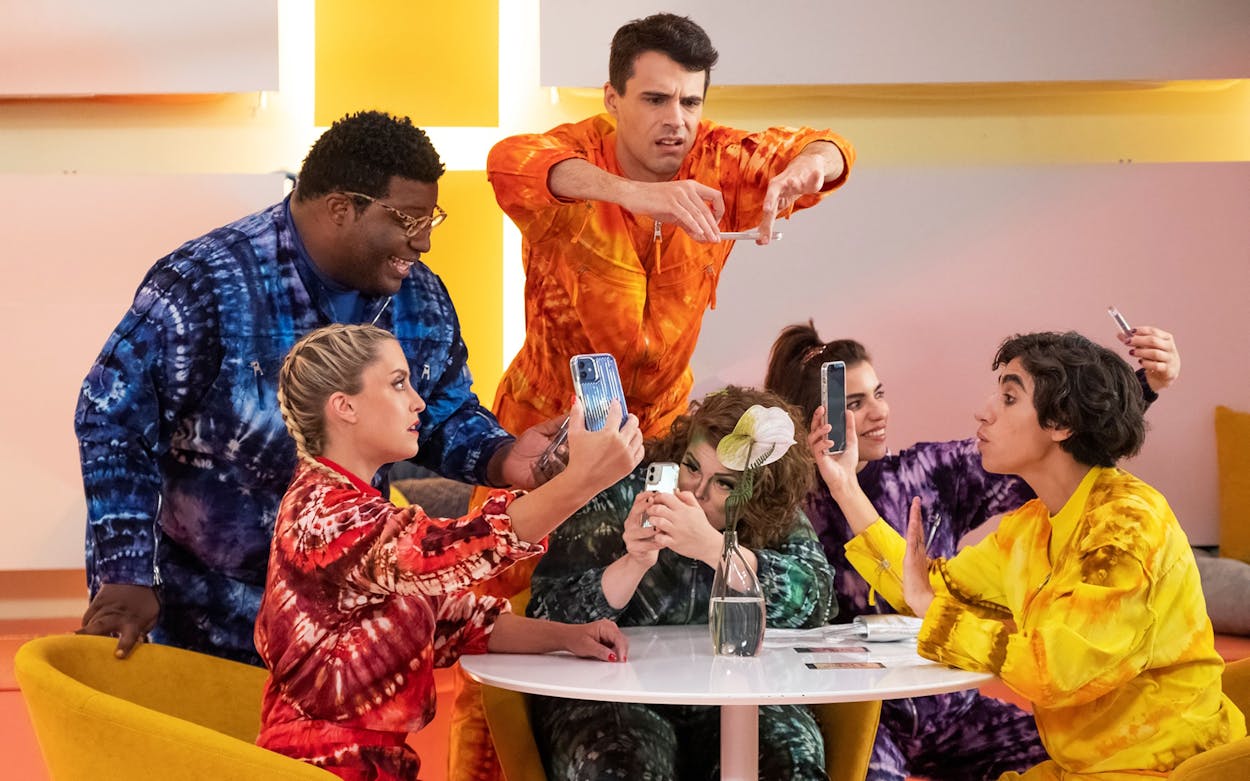At the risk of revealing that I am just as narcissistic as the show’s main characters, every time I watch Search Party, I think about myself. I am of the same generation as its four frivolous millennial main characters, and there was a time I proudly thought of myself as a “hipster.” I also spent my mid-twenties living in New York City, and the way the show satirizes semi-affluent, white, private-university graduates has always struck a chord. It’s a community I know well, and I know we deserve to be mocked, not so much for our therapy-speak and low credit scores, but in a darker way that investigates whether we are capable of caring about anyone but ourselves. Comedies must choose whether to punch up or punch down; watching Search Party has always made me feel like I’m punching myself. It’s what makes the show paradigmatic millennial art, a genre defined by its self-awareness of its self-obsession.
Search Party premiered on TBS in 2016. After two seasons there, it moved to HBO Max, where the show’s fifth and final season dropped on January 7. The show, cocreated by Sarah-Violet Bliss and Dallas native Charles Rogers, and costarring Houstonian Meredith Hagner, centers around four egocentric twenty- (and then thirty-) somethings: Dory Sief (Alia Shawkat), Drew Gardner (John Reynolds), Portia Davenport (Hagner), and Elliott Goss (John Early). Dory spends season one searching for a former college acquaintance who has gone missing, though it becomes clear early on that what she’s really searching for is a sense of purpose—something we millennials have been taught, however foolishly, to expect.
Search Party has always played with genre: it was a sitcom and a detective mystery in the first season, a fugitive story in the second, a courtroom drama in the third, and a hostage thriller in the fourth. This most-recent season steers gleefully into genre chaos and then violently combusts into a full-fledged horror satire, drawing inspiration from documentaries about cults, like The Vow, and Night of the Living Dead–style postapocalyptic thrillers. As usual, the performances are one of the show’s highlights. Alia Shawkat anchors this season, in which Dory tries to change the world by sharing the spiritual enlightenment she experienced when she died for a grand total of 37 seconds at the end of season four. She’s light and airy, but grounded, perpetually teetering between delusion and control. You could isolate a single line from any scene with Meredith Hagner and John Early and it would still be funny, even with zero context. And there’s a segment with John Reynolds involving something called “the Jesper Society” that feels as classic a piece of comedy as anything written by Mel Brooks. The season gets very weird (Jeff Goldblum plays an Elon Musk type . . .) and very, very silly (. . . who collaborates with Dory to create a pill that produces spiritual enlightenment). If you like absurdist humor and zombies, this season is for you. If not, you’ll probably find the ten episodes excruciatingly dumb.
That’s not to say that the minds behind the show aren’t brilliant. Bliss and Rogers have created a spot-on satire of millennial narcissism. It’s tonally experimental, often asking its viewers to pinball between hatred and compassion for its despicable, endearing main characters. It’s realistic enough to feel like a show about actual people, but those people make choices that are so wildly selfish as to be inhumane. There are multiple murders, all born of Dory’s need to believe her life has meaning. This selfishness is the punch line—it’s why the show is one of the best comedies currently on TV—but it can also be disorienting, especially if you see even a part of yourself reflected on-screen.
Search Party has grown less and less realistic since its first season, and the fifth, which (spoiler alert!) ends in a zombie apocalypse, is the least realistic yet. One would think I would have related less to Search Party this time around, but I still saw myself on the screen. Two years into the COVID-19 pandemic, isolating at home thanks to the omicron variant, my bathroom cabinet full of at-home nasal-swab tests I had to scour the city to find, I watched Dory and her cohort adapt seamlessly to their dystopian surroundings. They brought their selfishness and frivolity with them, like nothing had changed. Two years ago, I may have thought the screenwriters had gone a bridge too far. This time I thought, That’s exactly how a millennial would act in a zombie apocalypse.
- More About:
- Film & TV
- Television








